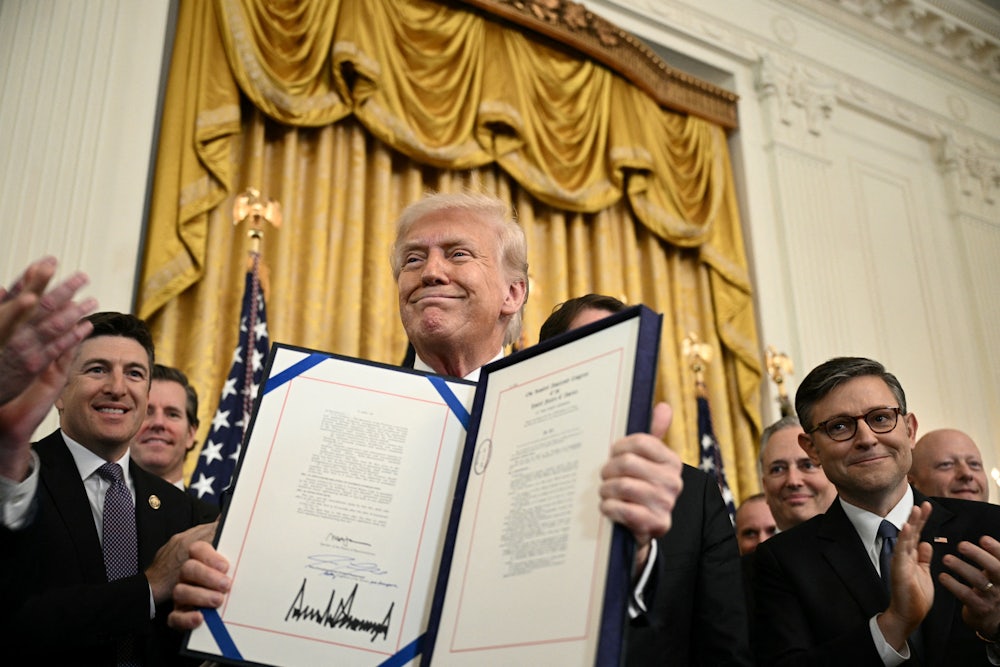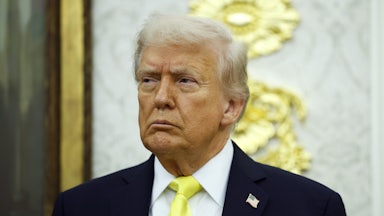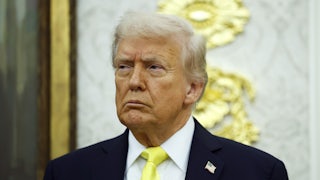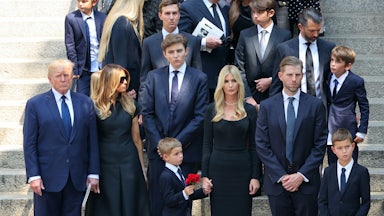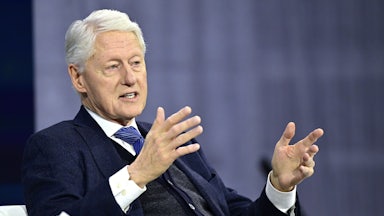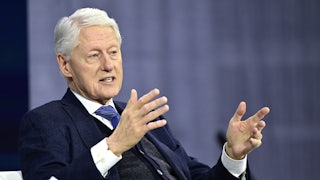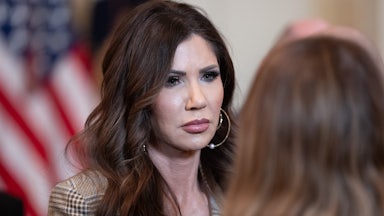The Federal Reserve lowered interest rates by another quarter of a percentage point Wednesday. Given a recent sharp falloff in job creation, that’s the right call. But it will further weaken the dollar, which has lost about 5 percent of its value since Donald Trump’s inauguration.
A falling dollar increases exports by lowering the cost of goods manufactured in the United States. That’s good. But it also increases the value of alternative currencies such as the euro, whose value has increased more than 7 percent since Trump’s inauguration, and gold, which is up by half. That’s bad, because it weakens the dollar’s preeminence as the global reserve currency, which, among other things, allows the United States to run up huge budget deficits and sell the debt the other nations. As I observed last fall, debt is America’s number one export, pulling in (last time I checked) $8.3 trillion per year.
Another alternative currency that, at least theoretically, acquires value from a weaker dollar is cryptocurrency, and Trump just happens to hold a multibillion-dollar chunk of crypto. That’s no small conflict of interest, and perhaps an underappreciated dimension to Trump’s mind-bending and ever-expanding financial corruption.
We probably haven’t yet reached a point where Fed actions can meaningfully alter the value of Trump’s crypto investment (really more of a gift, since Trump doesn’t appear to have paid anybody to acquire them). Since he reentered office, Trump has attacked Fed Chair Jerome Powell in rude and infantile ways for keeping interest rates too high. But Trump also did that during his first term, well before he acquired his cyber fortune. Then, as now, Trump’s primary motive was political. He wants job creation to increase, and he wants the Fed to help him argue that his tariff policies aren’t inflationary (reality check: They are, and Powell keeps saying so).
Still, it’s less than ideal to have a president whose loyalties are divided between his nation’s currency and his own. On the same day Powell moved, under heavy pressure from Trump, to weaken the dollar with an interest-rate cut, World Liberty Financial, of which the Trump family now owns a little more than one-third, moved to strengthen the value of its stablecoin USD1 by rewarding loyal customers with 8.4 million new tokens.
Was that timing really accidental?
This is an industry that Trump has promoted by, among other things, signing the pro-crypto Genius Act; by dismantling the Cyber Safety Review Board; by shutting down the Justice Department’s National Cryptocurrency Enforcement Team; and by handing out pardons to cybercurrency criminals like so much penny candy, including to his own business partner, Binance founder Changpeng Zhao.
The fear that Trump’s policies hurt the U.S. economy while enlarging Trump’s bank account is not new. In May, Harvard economist Kenneth Rogoff told Amna Nawaz of PBS that various actions Trump takes to weaken the dollar—his tariffs, his assaults against the rule of law, his doubling the size of the budget deficit—were good for crypto and therefore good for the Trump family’s holdings in crypto. Rogoff still thinks so. “Trump’s regulation-light, industry-friendly approach to crypto,” he told me Wednesday by email, “has been a major factor driving up the [crypto] price, thereby hugely benefiting his own investments.” Rogoff continued: “It is appalling to have the regulator in chief of an industry also be a major investor. Outside banana republics, almost no country allows that.”
Trump’s most outrageous abuse of power involving cybercurrency was to lift national-security restrictions on exports of AI computer chips to the United Arab Emirates two weeks after the UAE acquired $2 billion in World Liberty Financial’s USD1 stablecoin, which it then invested in Binance. This was, quite literally, the largest-ever financial transaction involving cryptocurrency. I’m hardly the only person to compare this episode, which The New York Times detailed in an excellent lead story last month, to Teapot Dome. I did so even before Zhao’s pardon enlarged the scandal’s scope.
The Biden administration appears to have had good reason to impose export restrictions on UAE. According to an October 25 report in The Financial Times, in 2022 UAE gave to the Chinese technology that United States spy agencies believe extended the range of long-range missiles fired from Chinese fighter jets. “American officials,” the FT’s Demetri Sevastopulo reported, “believed the technology … would give Chinese fighters even more time to target American fighters in any war over Taiwan.” Exasperatingly, Sevastopulo failed to connect this to the UAE’s $2 billion purchase of USD1. G42, the UAE company at the center of the FT story, is chaired by the same Sheikh Tahnoon bin Zyaed al-Nahyan who cut the USD1 and AI chips deals. He told the FT its allegations about missile technology were “patently false.”
Meanwhile, while none of us were looking, Trump became what Forbes’s Dan Alexander calls “one of the largest Bitcoin investors on the planet.” The president owns $870 million of the stuff via the Trump Media and Financial Group, the same company that operates Trump’s money-losing social media platform Truth Social. Trump owns a near-majority stake (previously 51 percent; now 41 percent) in the Trump Media and Financial Group, even though we know for a fact that he never invested any money in the company. (It’s good to be the president.) Through no effort of his own, Trump has become a Bitcoin tycoon. Forbes could identify only five human beings (two of them the Winklevoss twins made famous by the 2010 film The Social Network) who own more Bitcoin than Trump.
You can be forgiven for finding it difficult to keep up with all this blatant corruption. Nineteen months ago Trump’s net worth was $2.6 billion. Today he’s worth $7.1 billion. But that’s just on paper. How much cash has he raked in from crypto? According to a Tuesday story by Reuters, between January and June of this year the Trump family fattened its collective wallet by $802 million from sales of crypto assets—nearly three-quarters of it from foreign sources.
Among other consequences, the Trump Organization has ceased in any meaningful way to be a mere real estate company. While crypto was generating $802 million in revenue, the remainder of the company’s portfolio earned a mere $62 million, mostly from golf resorts and licensing fees. The crypto windfall comes mostly from World Liberty Financial, but don’t count out those idiot $Trump meme coins—they threw off an amazing $336 million. Let the word go forth: Since 2020, the signature Trump shakedown has graduated from hotel rooms to synthetic money.
What exactly is for sale? A World Liberty Financial lawyer told Reuters it was “a complete lie” that people buy into Trump’s crypto holdings to get close to Trump. But they forgot to tell Dorji Rabten, whose Seoul-based company, Oddiyana Ventures, bought a truckload of WLF1 coins in January. “In the first very moment where we saw the project, we thought it’s going to be very huge, obviously,” Rabten told Reuters, “given the fact it’s a president’s sons taking up that project.”
Will World Liberty Financial or Trump Media and Financial Group ever dominate the shadow-banking world? I doubt it. Any threat they might pose to the dollar as the world’s reserve currency is, shall we say, minimal. But these ventures weren’t really established to reshape the economy. They were built to generate hundreds of millions for one American family as its patriarch extends every conceivable break to this dubious financial sector. By that measure, they’re a runaway success.
